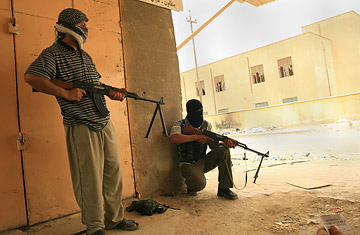
Iraqi Shiite militiaman take cover a gun battle with government forces in Basra's Al-Jumhuriyah neighbourhood on March 28, 2008.
Despite having been initiated by the Iraqi government, the offensive by Iraqi security forces against militiamen in Basra is increasingly drawing in the United States, both militarily and politically. U.S. air power was used in the key port city for the first time on Thursday night in support of Iraqi forces trying to dislodge fighters of Moqtada Sadr's Mahdi Army, and U.S. troops clashed with Mahdi Army militants in the Baghdad neighborhood of Sadr City on Friday. President Bush, speaking in Washington, called the fight a "defining moment" for Iraq, but the clashes could have important implications for the U.S. mission there, too.
"There has been Coalition air presence for four days," said Maj. Tom Holloway, a spokesman for the British military in Basra. He said that the request for air support had come from the Iraqi military, relayed through American and British liaison officers at the scene, and approved by U.S. military officials.
Holloway would not say whether the introduction of U.S. air power had required political approval by American or Iraqi civilian officials, but indicated that the use of American support was a contingency that had been built into plans for the Iraqi military's ground offensive.
"This procedure has been in place," Holloway said. "We are supporting the operation."
Holloway also sought to clarify earlier remarks that had been interpreted in Western media reports to mean that the U.S. planes had dropped bombs in Basra. He told TIME Friday night that American planes used heavy machine guns — not explosives — to attack two militia positions. He said the first had been a mortar team that had been firing on Iraqi soldiers, while the second was a fortified position that Holloway said had been "teeming with enemy."
Whatever the specific weapons used in the U.S. close air support operations in Basra, their significance is clear. Taken together with Friday's announcement by Prime Minister Nouri al Maliki that the three-day deadline he had originally given militia fighters to surrender their weapons had now been extended to 10 days (and that those who complied would be financially rewarded), the U.S. air strikes appear to indicate that the fighting has been tougher than Iraqi government officials had anticipated. And while they insist that the offensive is aimed only at "rogue elements" of the Madhi Army and other militias, the Sadr movement is treating it as a politicized attack by their Shi'ite rivals in the government aimed at weakening their position ahead of October's local government elections.
The United States, which had earlier emphasized that the offensive was the Iraqi government's initiative and responsibility, has now increased its political and military commitment to the operation's success. The longer the fighting in the south drags on, the greater the chance of an escalation in militia violence across the south and in Baghdad's Shi'ite neighborhoods — an escalation that could jeopardize many of the security gains made in the course of the U.S. troop surge.
On Friday, in what has become a daily occurrence, rockets or mortars slammed into the Green Zone, the heavily fortified central Baghdad sector that houses U.S. diplomats and the Iraqi government. One of the attacks hit the compound of the Sunni politician Tariq al-Hashimi, one of Iraq's vice presidents. The New York Times reported that one of his security guards had been killed. U.S. Embassy staff have been instructed to limit the time they spend outdoors and to wear helmets, flak vests and eye protection when they leave hardened structures.
Meanwhile, on Thursday, the civilian spokesman for the Baghdad security plan, Tahsin al-Sheikhili, was kidnapped from his home by gunmen. A source in Iraq's Ministry of Information told TIME that Sheikhli's bodyguards were overwhelmed by a dozen men armed with rocket-propelled grenades and assault rifles. Two of the bodyguards were killed and one wounded in the fighting; Sheikhli's family believes his captors are members of a Mahdi Army splinter group. With reporting by Abigail Hauslohner/Baghdad
